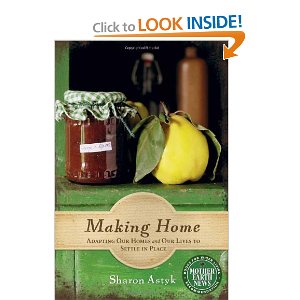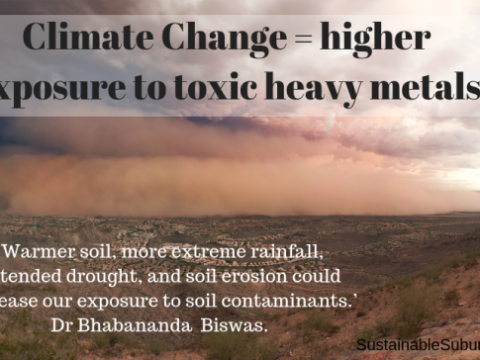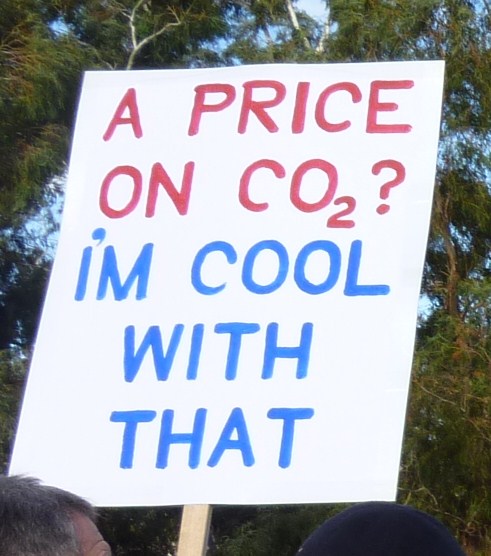Making Home: Adapting Our Homes and Our Lives to Settle in Place By Sharon Astyk; Published by New Society Publishers, Gabriola Island, 2012, RRP AU$27.99. Currently available on Fishpond $18.66 or Amazon US$14.56.
How do you change your life, right where you are, to become truly resilient to future shocks?
How do you do it despite non-compliant children, a lack of funds, and perhaps a despair-inducing level of panic?
Should you even be trying to adapt in place, or should you make the more now to the country/city or a tropical island (with land high above sea level of course)?
Sharon Astyk’s new book Making Home is part how-to, part memoir, and all inspiration.
In it she argues that change is coming, whether we like it or not, and not only in the form of climate change. Astyk makes a convincing case for assuming America, at least, is heading for large scale economic collapse within our lifetimes, and possibly fairly soon. 2008 was no more than a warning bell.
But this is only the beginning of her book, and sets the scene for the ways in which we will need to adapt to survive well (and possibly to survive at all), and more particularly provides the motive for beginning that adaptation now.
Astyk covers basic day to day issues like staying warm, lighting our homes, and keeping our food cold in the context of possibly unreliable electricity or gas supplies, or of simply not being able to afford to pay hefty power bills. She shows us how we can adapt now, so that we are not having to create and fund two systems – one for now, and one for ‘just in case’.
She also discusses wider philosophical issues including marriage (how to do keep your marriage together when you are panicking and your partner is burying her/his head in the sand?), family and community, and more hot button topics like personal security and money.
In the new economy, Astyk convincingly argues, community will be of a whole new order of importance. Bartering, sharing and generally operating outside of the formal economy will become essential daily activities. So how do we build community and accept that interdependence in advance?
One of the great benefits to reading books like Making Home goes well beyond the practical information Astyk provides. By sharing some of her own life, as well as sprinkling through the book short profiles of others who are adapting, we are given some real insight into how this can work in reality. And perhaps more importantly, it normalises seemingly radical lifestyle changes.
Being different to the mainstream, without cultural or community support, is hard.
It’s hard when you are talking about accepting that a ‘working home’ will never look like a magazine spread, that the lush green lawn you’ve been trained to think of as beautiful is actually not only unproductive but inherently unsustainable.
It’s harder when you’re talking about making real lifestyle changes that involve self-sacrifice and perhaps working together with neighbours, for instance by living car free, and bartering for lifts with others when you really need them.
These things would be easier if everyone were doing them; if there was a general understanding that the lifestyles of the Western World simply cannot be sustained, even in the relatively short to medium term.
One of the benefits, then, to reading books like Making Home, is that it helps to normalise for us a different way of life. If, for instance, we are considering whether we can manage with only one car, then hearing a serious discussion about getting by without a car at all might make our decision to at least downsize easier, even in the face of friends telling us how hard it will be.
This is an exceptional book.
My only two disappointments are really minor quibbles.
Firstly, as an Australian, I was subject to the usual disappointment of reading a solidly US-centric book. But that is hardly a valid criticism, since that is the landscape Astyk knows and is primarily writing for. And as is often the case, it does not overly affect the book’s value to me.
While Astyk’s arguments for economic collapse focus on the situation in the US (and the Australian economy is currently much stronger), it is not a huge step to suppose that US economic collapse will adversely affect us Down Under too. Especially in the context of a slowing Chinese economy and the current European crises.
As for the rest of the book, the details are largely transferable to Australian soil without change. We are certainly very vulnerable to the effects of climate change and equally dependent on fossil fuels. I would be surprised to discover that there were any cities within Australia where keeping chooks (poultry) was not legal though.
My other slight quibble is that, although Astyk is clear that she believes most urban, suburban and rural areas have the potential to adapt and have a future of some sort, much of her book – and particularly the sections on food and animals – have something of a rural focus. However, again this is perhaps inevitable, given that this book is part memoir, and Astyk lives rurally. So while she does cover issues around food production and keeping animals inside city limits, she – mostly – does not do as from her own experience. I did appreciate that the book closes with a final profile of an urban dweller.
Those two minor issues notwithstanding, this is a book for everyone. I read a lot of books, and generally review only the best ones, but this book has shot to the top of my ‘must read’ list. If my family exchanged Christmas presents, they would each be getting a copy of Making Home this December. They may do anyway. It really is that good.






Intriguing review. It’s now on my list of must-reads.
My criticism with a lot of these books is that (1) they tend to be written from an American context; (2) they tend to feature animal husbandry heavily; and (3) they tend to have an underlaying philosophy that is at odds with my own, i.e. religious or spiritual.
Thanks for your comment Paul, I hope you find time to read it. It *is* inevitably US-centric, but it’s worth the read all the same!
Intriguing review. It’s now on my list of must-reads.
My criticism with a lot of these books is that (1) they tend to be written from an American context; (2) they tend to feature animal husbandry heavily; and (3) they tend to have an underlaying philosophy that is at odds with my own, i.e. religious or spiritual.
Thanks for your comment Paul, I hope you find time to read it. It *is* inevitably US-centric, but it’s worth the read all the same!
I want to read this book 🙂
I love your blog!! It´s awesome , I gave credit in this post http://discoveringranchlife.blogspot.com/2012/11/sustainable-living.html
All the best,
Maria
Thanks Maria, for your comment and for the shout-out! Do read the book, it is awesome 🙂
I want to read this book 🙂
I love your blog!! It´s awesome , I gave credit in this post http://discoveringranchlife.blogspot.com/2012/11/sustainable-living.html
All the best,
Maria
Thanks Maria, for your comment and for the shout-out! Do read the book, it is awesome 🙂
Sounds like a worthwhile read.
For a not so ‘US-centric book’ – have you read Honeycomb Parenting? It’s based on parenting – but focuses on the idea of being prepared for a uncertain future and resilience. T
Hi Tricia,
Yes, I have got Honeycomb kids from the library at the moment actually 🙂 I’m liking it, although so far (aside from the introductory chapters about *why* we need to build resilience to change), a lot of it seems similar to other parenting books, in terms of things like helping them learn problem solving skills etc. Good, but not new a such, though I am only a third of the way through so far.
It’s an area I am really interested in looking more at though – how do we parent our children in a way that will prepare them for a very uncertain future, one that may be radically different to the present.
Sounds like a worthwhile read.
For a not so ‘US-centric book’ – have you read Honeycomb Parenting? It’s based on parenting – but focuses on the idea of being prepared for a uncertain future and resilience. T
Hi Tricia,
Yes, I have got Honeycomb kids from the library at the moment actually 🙂 I’m liking it, although so far (aside from the introductory chapters about *why* we need to build resilience to change), a lot of it seems similar to other parenting books, in terms of things like helping them learn problem solving skills etc. Good, but not new a such, though I am only a third of the way through so far.
It’s an area I am really interested in looking more at though – how do we parent our children in a way that will prepare them for a very uncertain future, one that may be radically different to the present.